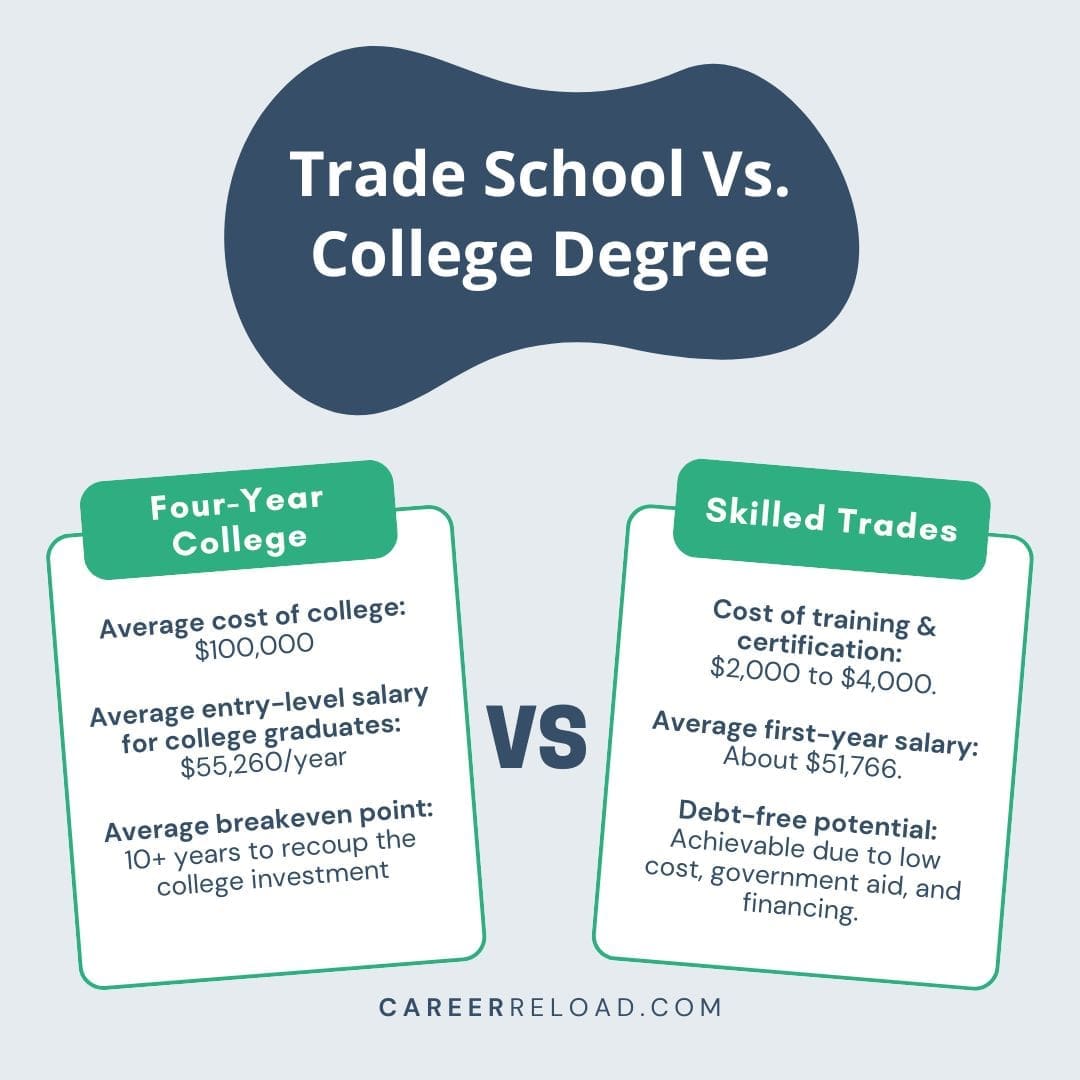For decades, the traditional wisdom has been that earning a college degree is the surest way to achieve financial security and professional success. Yet, as tuition prices soar and student debt becomes a national conversation, many are beginning to wonder if the four-year track is still the only or even the best path.
Trade school, once overlooked, is enjoying renewed attention as employers struggle to fill essential roles in construction, healthcare, and other skilled trade sectors. This shift raises an important question: in today’s economy, is a college degree still worth it, or can trade school offer equal, if not better, opportunities?
What is trade school vs. what is a college degree
Trade school, sometimes called vocational school or technical school, focuses on equipping students with hands-on training for specific careers. Programs are typically one to two years long and prepare students for jobs such as electricians, welders, mechanics, or dental hygienists. The emphasis is practical: students leave with certifications and skills directly applicable to the workforce.
A college degree, on the other hand, requires a broader academic investment. Students spend four or more years in programs that combine general education with specialized majors. Graduates may pursue careers in fields such as business, technology, healthcare, education, or social sciences. While the focus is less immediately practical, the intent is to develop critical thinking, communication, and a foundation for long-term career growth.

Tuition, debt, and hidden expenses
The financial difference between trade school and college degree paths is striking. According to recent data, the average trade school program costs between $5,000 and $15,000 in total. In comparison, a four-year public university can cost upwards of $40,000, and private colleges often exceed $100,000.
Beyond tuition, student loans introduce another layer of complexity. College graduates carry an average debt burden of around $30,000, while trade school graduates often borrow far less, if at all. This disparity shapes financial freedom long after graduation.
There are also hidden costs. Trade school students may need to purchase specialized tools or pay for licensing exams, while college students face expenses like textbooks, housing, unpaid internships, and fees for extracurricular activities. These less visible costs can add tens of thousands of dollars to the price tag of a degree.
Speed of entry and earning potential
Time is another key factor. Trade school graduates typically enter the workforce in as little as one to two years, giving them a head start on earnings and hands-on experience. By age 20 or 21, many are already earning salaries and building their careers.
College degree holders often spend four years in school, and some continue into graduate programs before seeing real income. That delay can mean years of lost wages. While college graduates may eventually catch up or surpass trade professionals in lifetime earnings, the early start enjoyed by those in a skilled trade often provides financial stability sooner. Compounding savings and investment opportunities can make this early entry into the job market particularly advantageous.
Job demand and long-term growth
One of the strongest arguments for trade school is the high demand for skilled workers. Industries such as construction, electrical work, plumbing, and automotive repair face significant labor shortages. Healthcare fields, too, are seeing growth in roles like medical technicians and dental hygienists. For those pursuing a skilled trade, job stability is often greater than the public realizes.
College degree careers tend to offer broader options, ranging from technology and finance to education and government roles. Many of these fields provide clear pathways for advancement, often tied to organizational hierarchies. While a skilled trade offers consistent demand, a college degree can open doors to more varied industries with opportunities for leadership and cross-sector mobility.
Salary comparison: Initial vs. lifetime earnings
Starting salaries between the two paths are surprisingly competitive. A licensed electrician, for example, can expect to earn $50,000–$60,000 within a few years, while an entry-level college graduate may start closer to $45,000 depending on the major.
Over time, lifetime earnings do tend to favor those with a college degree, with averages exceeding $2 million compared to $1.5 million for trade school graduates. However, these numbers often mask the nuances: a skilled trade professional with entrepreneurial ambitions can significantly exceed averages, and a college graduate in a low-paying field may earn less than a plumber or welder.
Factors like geographic location, networking, and willingness to continue learning and adapting have as much influence on income as the initial choice between trade school and a degree.
Which path fits your personality?
Choosing between a trade school and a college degree isn’t just about money, it’s also about lifestyle. Skilled trades often involve physical work, varied environments, and a degree of independence. Electricians, carpenters, and mechanics may travel to different sites, solve tangible problems, and often enjoy the satisfaction of seeing immediate results from their work.
College degree careers, in contrast, often involve office settings, structured hierarchies, and collaborative projects. These roles may appeal to those who thrive in environments emphasizing analysis, communication, or leadership. Work-life balance can differ as well: while some trade jobs may require irregular hours, others offer predictable schedules. College-based careers may involve high-pressure corporate demands but can also provide remote and flexible opportunities.
Future-proofing your career: Automation, AI, and shifting industries
The question of future security is becoming increasingly relevant. Automation and artificial intelligence are reshaping many industries, particularly those that rely on repetitive or data-driven tasks. Certain office jobs commonly pursued by college degree holders, such as basic accounting or administrative work, face significant disruption.
Skilled trades, however, are less susceptible to automation. It’s difficult for machines to replicate the nuanced problem-solving required for plumbing repairs or electrical installations. Similarly, healthcare technicians require a level of adaptability and patient interaction that technology cannot fully replace. Still, both paths demand a mindset of lifelong learning. Whether you choose a skilled trade or a degree, continuously upgrading your skills is essential for staying competitive.
Challenging the myths
Misconceptions cloud both trade school and college degree paths. Trade school is often unfairly perceived as a fallback option for students who struggle academically, when in reality it requires technical expertise, precision, and adaptability. Skilled tradespeople are entrepreneurs, problem-solvers, and community lifelines.
On the flip side, a college degree has long been marketed as a guarantee of success. Yet the underemployment rate among degree holders shows otherwise. Many graduates work in jobs unrelated to their fields, and some struggle to repay loans despite holding advanced qualifications. Success depends on how individuals leverage their education, not simply on the diploma itself.
How to choose the right path for you
Deciding between trade school and a college degree requires honest self-reflection. Ask yourself:
- Do you enjoy working with your hands or solving problems in a tangible way?
- Can you manage the financial burden of a four-year degree, or would a shorter, less expensive program better suit your situation?
- Are you looking for quick entry into the workforce, or do you prefer the broader exploration that college allows?
- What kind of work environment energizes you? Physical and dynamic, or structured and analytical?
These questions help clarify which path aligns with your strengths, preferences, and long-term goals.
Blending trade skills and higher education
For many, the choice isn’t strictly one or the other. Hybrid approaches are increasingly common. An HVAC technician may later earn a business degree to expand into company ownership. Nurses often pursue additional certifications or advanced degrees to move into specialized or managerial roles.
In an economy that values adaptability, combining a skilled trade with academic credentials can create a powerful advantage. It allows for both practical expertise and the broader perspective necessary for leadership and innovation.
Is a four-year degree still worth it?
The question of whether a college degree is still worth it doesn’t have a universal answer. For some, the intellectual growth, networking opportunities, and long-term earning potential make it a clear choice. For others, trade school provides a faster, more affordable path to a stable and fulfilling career in a skilled trade.
What’s important is recognizing that both paths hold value. The measure of “worth” lies in how well the choice aligns with your goals, resources, and the life you want to build. By moving beyond stereotypes and focusing on fit, today’s students can make informed decisions that lead to meaningful and sustainable careers.

Sara has been in the career development field for over 10 years and has a wealth of knowledge to share. She covers topics such as resume writing, job search strategies, interview techniques, career planning, and more. She has curated our free downloadable resume templates for Word and resume templates for Google Docs.

Others also read
Substitute Teacher Resume Example & Writing Guide
5 Best Resume Frameworks and How to Use Them
When and How to List References on a Resume
How to Spot and Avoid a Fake Job Posting
What Employers Look For in a Resume in 2026
How to Write a Resume Summary and Why You Need One
How to Create a Resume in Word (Step-by-Step Guide)
What to Include in a Letter of Recommendation
You Might Also Like These Free Templates
Google Docs Resume Format – Debbie
Free Resume Form Template
Free Resume Design – Megan
2 Column ATS Resume Template
ATS Friendly Resume Format for Word – Lindsay
Goal Planner Template
Cover Letter Template with Monogram
Professional Cover Letter Template
Free Modern Resume Template for Word
Free Job Application Tracker for Excel
Free Resume Template Download for Word – Farrah
Free ATS-Friendly Resume Template – Emily